We are delighted to announce that we are continuing our sponsorship of The Pony Club Winter Championships Show Jumping and Dressage into 2017.
Dengie have supported the Winter Championships Show Jumping since it was introduced in 1995; with an Open level of Show Jumping being introduced in 2006 and a Dressage competition introduced in 2007, both quickly gained equal kudos.
All aspects of the competitions have gone on to become a rite of passage for talented grassroots riders, with many of the success stories going on to feature at The Pony Club Championships in the summer months.
James Loffet, Director of Disciplines at The Pony Club said: “We are thrilled to be continuing to work with Dengie on the development of The Pony Club Show Jumping and Dressage Winter Championship competitions. Our Members benefit enormously from the wide knowledge that Dengie bring; the partnership between The Pony Club and Dengie is well established, and works well as we share so many of the same values and ideals.”
There are also developments afoot for the competition, following on from the successful addition of an Intermediate level for the Dressage competition and the new venue of Addington Manor Equestrian Centre, Buckinghamshire; 2017 will see the introduction of a new show jumping class, Debut, that introduces an 80cm course to the competition, allowing riders to gain confidence in a championship environment.
Lisa Wilson, Marketing Manager commented “We are delighted to be continuing our support of the Pony Club. Having been the sponsor of the Winter Championships for over 20 years the “Dengies”, as they have now become known, are hugely important to us. Dengie is committed to educating young riders in healthy equine nutrition and the Pony Club is where it’s at!”
For further information on The Pony Club or The Pony Club Dengie Winter Championships click here
Haydn Price, Team GB Lead Farrier and Consultant Farrier to the British Equestrian Federation (BEF) and World Class Equestrian Programme (WCP) has been a practicing farrier for over 30 years and has a special interest in performance and lameness shoeing techniques. He has been instrumental in the practical application and understanding of farriery-specific biomechanics and the utilisation of equine gait analysis systems.
Haydn is also an international lecturer, academic researcher and the co-author of Shoeing for Performance. In 2011, he was awarded the BEF Medal of Honour for his continued contribution to farriery within the BEF and the WCP. In 2013, he was inducted into the International Farriery Hall of Fame for his continued services, commitment and education to the International Farriery Profession.
Married for 31 years, he and his wife have a daughter and small grandson. His main interest outside his work is flying helicopters and he has been known to drop into many of his clients in his helicopter – but his van and kit have to be driven there by one of his team!
As part of a series of exclusive interviews with equestrian professionals, Haydn Price gives Dengie an insight into his work and how he got started.
How did you get started as farrier?
I was transfixed by the process when having my pony shod for the first time at the tender age of 14. I went to the Hereford School of Farriery and we were lucky to have studied under the stewardship of some of the best lecturers of our time.
How would you describe what you do?
We are first and formost a service industry to the public sector and there are varying levels of business practice – some specialise in youngstock, some in racing and others like me have a particular interest in the performance horse.
What is your normal work day?
My alarm normally goes off at 6.00am, unless we are off early traveling and working away from home. At 6.20am, it’s freshly ground Columbian coffee to kick start the day – none of that instant stuff for me! We aim to have our first appointment in for 7.30am, then it’s a matter of keeping to timed appointments for the rest of the day. In the winter months we have normally finished the day’s routine work by 4.30pm. In the summer months that can extend to 6.30pm or even later. The day rounds off with sorting emails out and any telephone calls until around 8pm, when dinner is served by Mrs Price!
What do you like about what you do?
Apart from the obvious connection with horses, I also enjoy the interaction with other people. I particularly enjoy the problem solving aspect and working alongside other professional colleagues and riders. Competition horses are subjected to the repetative strain injuries similar to the human athlete, so it is important that we operate a pro-active approach to the prevention of injury equally as much as a reactive one when a problem occurs.
What is most challenging about what you do?
The intellectual challenge of trying to unravel the complications that are often involved with poor performance and/or longer term lameness issues. It’s all worth it though when you get a horse back on the road again, at any level, so that they can fulfil their owner’s expectations.
How much time off do you get/take?
Ummm very little, ask my wife! But I do get to travel and see some great places when I am part of Team GB, such as the Rio Olympics. I hope we will get to see a bit of the surrounding area but we are there primarily to support the riders and the horses.
What is a common misconception people have about what you do?
That I am semi-retired! I might be in the silver hair group but I am still working full time and seem to get busier rather than slowing down. It’s not just a question of shoeing what you get on the day – it’s about preventative measures and taking time to treat each individual horse.
What is the most valuable thing being a farrier has taught you?
That there is no excuse for not pushing the boundaries to achieve the best and you can only do so by giving 100% of yourself up to the challenge.
Dengie customer Caroline Chambers got in touch recently to let us know how pleased she has been since changing her horse’s diet on to Dengie Alfa-A Oil.
“I started feeding Dengie Alfa-A Oil to my small hunter, Uisce (aka Copper) four months ago as I felt he needed some extra condition going into the showing season. His coat was dull in colour and dry so I felt he needed a bit of extra oil in his diet. Dengie Alfa-A Oil was the perfect solution!” says Caroline.
“After a short period of time the condition of his coat has improved immensely. He is out competing every week, hacked at least twice a week and has training sessions 3 times a week. He is improving all the time and is building muscle more and more each week. I would highly recommend anyone looking for that little bit of extra condition on their horse to give this 5* product a try!”
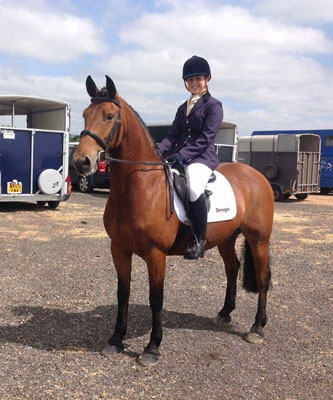
Dengie Alfa-A Oil is the ultimate pure alfalfa fibre feed for fuelling hard work, improving stamina and promoting condition. The high oil content comes from rape seed oil, which is ideal for those horses that are looking for show ring condition, healthy skin and coat shine!
Click here to find out more about Dengie Alfa-A Oil
As a company, we are devoted to supporting young riders and in doing so hope to help educate them on the importance of a healthy diet for their horses and ponies. This is why we are delighted to be the official feed sponsor for British Dressage’s British Young Rider Dressage Scheme (BYRDS) 2016-2017.
For riders aged 6 to 25, the BYRDS programme is the youth arm of British Dressage’s activities and supports training, competing, teams and learning and is one of the sport’s fastest growing areas.
Our sponsorship will include providing nutritional support, diet assessment for riders’ horses plus educating young riders on the importance of nutrition and fibre feeding for performance.
Our nutritional team will be on hand at the programme’s high profile events including the Pony Prime and Progress Squad Training and High Performance Camps to discuss any feed related issues with BYRDS riders and their parents.
The Dengie team will also be supporting camps around some BD regions for riders both young and old to give a thorough basic training (in and out of the saddle), in order to enable them and their equine partners to develop their skills as they progress through the stages of training and competition levels.
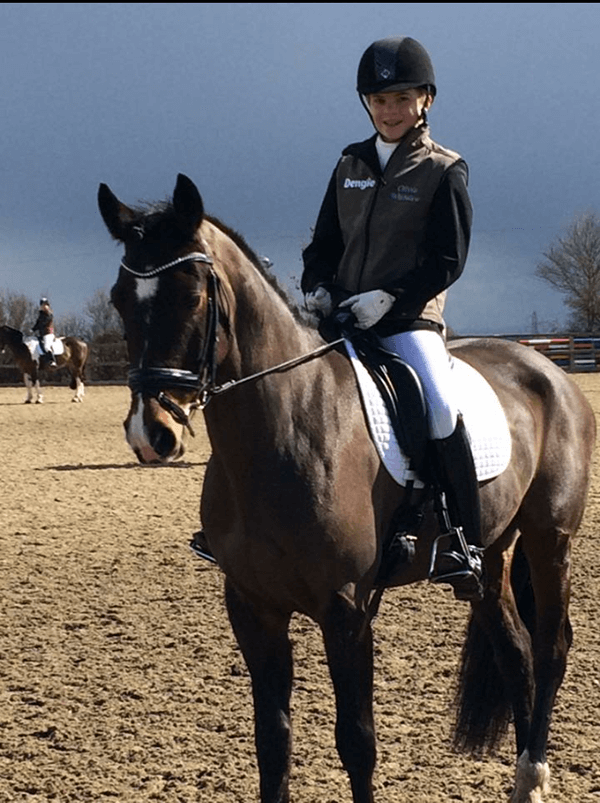
Dengie brand ambassador Olivia Whitelaw (12) has been an avid BYRDS participant for three years. She’s excited about the partnership; “Having my incredible sponsors Dengie as a key supporter of BYRDS is brilliant news. Whilst on the Pony Progress squad myself this year, Dengie’s team have been constantly giving feedback and help with my ponies’ diets. This nutritional support keeps the ponies in peak condition for training and competing. With one pony being young, the advice has been really useful in managing his ever changing dietary needs so he can grow and develop his strength in accordance with his increasing work and training level.
This regular feedback, shared knowledge, ongoing nutritional advice and guidance will be beneficial to all the BYRDS riders and their ponies/horses enabling us to perform at our best.”
As part of a series of exclusive interviews with equestrian professionals, Dengie catches up with Tim Beauregard from Summerhill Equine Vets. In this interview Tim talks to Dengie about his most memorable experiences as a vet and tips on how Dengie followers can give their horse a head start in the health and fitness stakes this summer.
Describe your normal work day
Does that exist?! That’s why I love my job! A busy day involves gastroscopy, tracheal washes, lameness workups and treatments, vettings and paperwork. Doing about 40,000 miles per year means about six hours a day is lost on the roads, so I have to have a comfortable car.
Do you have any “famous” clients – horses or humans – that you can share with us?
Carl Hester and Paul Nicholls plus all of the famous horses that are attached to both yards.
What has been the most memorable or inspirational experience with your career?
Being on the Thames, celebrating London 2012 with a boatload of medallists and other eminent people in the equine community.
Are you seeing any increases in certain ailments or diseases in your particular area?
Not so much increased prevalence but definitely increased diagnosis now we have the benefit of advanced technology such as gastroscopy, CT and MRI, plus the esteemed specialists that guide us in our daily work.
Any advice for horse owners on particular seasonal issues – how to avoid them?
Always have clean hay/haylage. I can’t stress this enough! Many times horses are diagnosed with “a virus” when the real reason is inhalation of fungal spores. The easiest thing to do is to stuff your face into the forage and take a deep breath. This ruins me if it’s bad quality, as I will get bunged up and sneeze for days. At Summerhill Equine Vets, we quantify the amount of spore contamination using our own laboratory and advise our clients whether it is safe to feed or not. For racing yards, we find a direct correlation between spores and poor tracheal wash results, followed by poor performance, and although the effects are less defined in sports horses they suffer just the same.
Is there anything that really frustrates you about the equestrian industry?
Although more wealthy than the farming industry, I see many employees dedicating their lives without suitable financial recognition. They regularly work 10 to 14 hour days to get everything done, without any choice because the horses need to be looked after and employers can’t afford more staff. Unfortunately, I don’t have a solution to this problem.
Give us your top 5 tips for keeping a “riding club level” horse in good overall health with a view to going to shows this summer.
- Clean hay or, if you can’t guarantee its freshness, consider a Dengie alfalfa feed as it’s bagged and a great source of clean fibre.
- Work on fitness to avoid injury.
- Horses thrive on routine, so in respect of daily management and exercise try and keep this routine the same. It’s amazing how a routine can prevent illness, accidents and keep a horse’s stress levels down.
- Fresh air i.e. turnout.
- Water and chemicals are the enemies of skin health, so go easy on the bathing! One grotty winter I was at Barry Hills’ yard and couldn’t help but notice how healthy the horses looked, their coats were gleaming compared to other yards struggling against rashes and ringworm. The head lad Kevin Mooney had a clear answer – they don’t go near the horses with a drop of water all winter; instead they allow the sweat to dry and brush it off at evening stables. By doing this they don’t remove the natural oils from the coat, which are the protective barriers. I’m not saying that you shouldn’t wash your horse, but be sparing and avoid shampoos as much as possible.
At a recent seminar hosted by Dengie, leading veterinary expert Professor Celia Marr from the world famous Rossdales Equine Hospital and Diagnostic Centre in Newmarket, gave an update on Equine Gastric Ulcer Syndrome (EGUS).
- Recent research suggests that once horses begin training their likelihood of developing gastric ulcers increases.
- Figures show that 43% of untrained racehorses suffer with equine ulcers and once in training that figure jumps to between 80-100%.
- 48% of endurance horses are reported to have them out of season – while this jumps again to between 66-93% when they are in competition.
- 17-58% of competition and show horses in competitive work have ulcers
- And the most surprising results were that of pleasure horses of which 37-59% suffer from EGUS.
While there are many possible causes, high concentrate diets and intense exercise have been identified as the trigger in many equines.
And whilst there can be many other medical causes of the same clinical signs that horses with ulcers display, it was agreed that endoscopy is the only way to definitively diagnose ulcers. Gastroscopy (endoscopy of the stomach) is carried out by a skilled veterinarian if a horse is underperforming or isn’t quite right in some cases as part of a wide-ranging diagnostic investigation.
Once a horse is diagnosed with EGUS then Celia Marr discussed the various ways of treating and helping prevent their recurrence.
While Omeprazole medications were found to be the best practice for treatment, advice is to change feeding and management of the horse to reduce the risk of recurrence.
For years riders have been told not to feed horses for at least an hour before exercise. Research has found that feeding a small amount (couple of handfuls) of alfalfa chop helps to reduce the acid in the stomach from splashing around and causing ulcers. This practice is now being adopted by many racing and professional sports horse yards with great results. Click here to read more about the benefits of alfalfa
Feeding more fibre and reducing reliance on cereal based feeds is also beneficial. Advice is that starch intake should be less than 2g per KG of bodyweight per day to reduce the risk of ulcers. Free access to water at all times is also essential. For additional energy it is recommended that oil/oil based feedstuffs products are much more suitable than that of starch such as Dengie Alfa-A Oil that provides the same level of energy as a competition mix but 10 times less starch typically.
 Dengie Healthy Tummy is a complete fibre feed containing ADM Protexin In-Feed formula which helps to maintain optimum levels of acidity within the gut. Suitable for horses in light to moderate work when fed at the recommended quantity this alfalfa based feed has the natural buffering capabilities to keep the gut healthy.
Dengie Healthy Tummy is a complete fibre feed containing ADM Protexin In-Feed formula which helps to maintain optimum levels of acidity within the gut. Suitable for horses in light to moderate work when fed at the recommended quantity this alfalfa based feed has the natural buffering capabilities to keep the gut healthy.
For horses in hard competition work Healthy Tummy can be fed alongside traditional mixes and cubes or can be combined with Dengie Alfa-A Oil.
 Alfa-A Oil has no added sugar and is low in starch yet high in oil and provides as much digestible energy (12.5MJ/kg) as a conditioning or competition mix/cube.
Alfa-A Oil has no added sugar and is low in starch yet high in oil and provides as much digestible energy (12.5MJ/kg) as a conditioning or competition mix/cube.
If you want like to know more about either of these products, or would like advice about feeding the horse or pony diagnosed with EGUS don’t hesitate to phone the Dengie Feedline team on 01621 841188 or chat live to a nutritionist online.
Tim Beauregard joined the renowned equine veterinary practice, Summerhill Equine Vets, set up by Buffy Shirley–Beavan, back in 2004. Based in Gloucestershire and with a team of four highly experienced performance horse vets, they offer an ambulatory equine service to many professional racing and sports horse yards in the area. Their focus is management of the equine athlete, dealing with preventative management and treatment of the variety of problems that performance horses experience. Tim has a young family and his early morning routine usually means bottle-feeding his baby son – if he hasn’t had a panic call out from a local National Hunt yard!
As part of a series of exclusive interviews with equestrian professionals, Tim Beauregard gives Dengie an insight into his work and how he got started.
How did you get started as veterinarian?
A love of animals and a lengthy vocational questionnaire! I grew up in rural New Zealand, surrounded by pets, milking goats and cows, and there was an expectation on the part of my parents that I would go to university.
What college did you attend?
Massey University, New Zealand. This started as an agricultural college but developed into one of the key tertiary institutions of that country and boasts its only vet school. I was one of 77 in my class, which is an incredibly small number of graduates considering that there were 5 million cattle, 60 million sheep and about 50,000 horses at the time.
What kind of experience did you have around horses before you became a veterinarian?
Casual riding with friends, which basically means riding around the wild countryside of New Zealand, doing yearling sales prep at Trelawney Stud in Cambridge (NZ), which is a prominent thoroughbred breeding establishment, and spending time with excellent equine vet mentors back home.
What is most challenging about what you do?
Keeping to a schedule – these days I avoid schedules. Instead I try to work around the clients’ days and use modern technology to liaise.
What is most rewarding about being a veterinarian?
Solving the problems and getting to know the great people in our industry.
How much time off do you get/take?
It should be 4 weeks but usually is less. Taking time off means having to work doubly hard before and after, so it’s actually less stressful just to keep working every day.
What is a common misconception people have about what you do?
That I wear a rubber glove all day long, and that I have great tips for the big races!
What is the most valuable thing being an equine veterinarian has taught you?
You can’t always control things that you face, animal or inanimate.
Little Oscar Wilkins, at just 21 months old, was one of the youngest Royal Windsor Horse Show visitors to sample life in the saddle on the mechanical horse RoboCob. The show (12-15 May) was the latest date on the Take up the Reins Tour of Great Britain, where RoboCob joined the Dengie team on our stand.
Those who enjoyed a ride received a goody bag with a booklet on getting started and vouchers for a £10 Equestrian Taster Experience (towards a riding session) and a free pair of riding gloves when buying their first pair of jodhpurs and boots.
The Take up the Reins campaign, devised by the British Equestrian Trade Association (BETA) and supported by Hoof, the British Equestrian Federation (BEF) participation initiative to encourage more people into the sport*, aims to get those of all ages and backgrounds connecting with horses.
This fabulous, fun initiative is promoting the benefits of being around horses – improving health, fitness and wellbeing, whether in or out of the saddle. Getting horsey can also help to build precious family time where parents and children put down the tablet and mobile phone, and enjoy a group activity. This can lead to a more switched-on, vibrant life with new opportunities.
Those who want to keep their feet firmly on the ground might help at their local riding stables or become a volunteer at an equine charity, where they can still experience that powerful connection with horses and build friendships with like-minded people.
For more information about the campaign and the Take up the Reins Tour of Great Britain, visit takeupthereins.co.uk.
Team Dengie will be encouraging visitors to this year’s Royal Windsor Horse Show 11th-15 May, to Take up the Reins and #GetHorsey with the campaign’s mechanical horse RoboCob. RoboCob will give everyone the chance to experience what it feels like to be in the saddle, at a walk, trot or canter.
The campaign, Take Up the Reins was devised by the British Equestrian Trade Association (BETA) and supported by Hoof, the British Equestrian Federation (BEF) and is designed to encourage more people into the sport. It aims to get people of all ages and backgrounds connecting with horses by riding, volunteering to help out at their local equine charities or attending equestrian events to show their support.
Currently on an awareness-raising tour of Britain, RoboCob will feature on the Dengie trade stand which is situated at no 17 in the Royal Warrant Holders Association Pavilion. In addition to providing this simulated riding experience, our team of nutritionists will be promoting the importance of a fibre diet for equine health and wellbeing. We will also be launching the Dengie Fit Club – an initiative that gives advice and support to owners who want to ensure their horse is of a healthy weight. With over 23% of horses being classed as overweight in an independent study carried out last year, Dengie aim to educate horse owners about the links between obesity and disease.
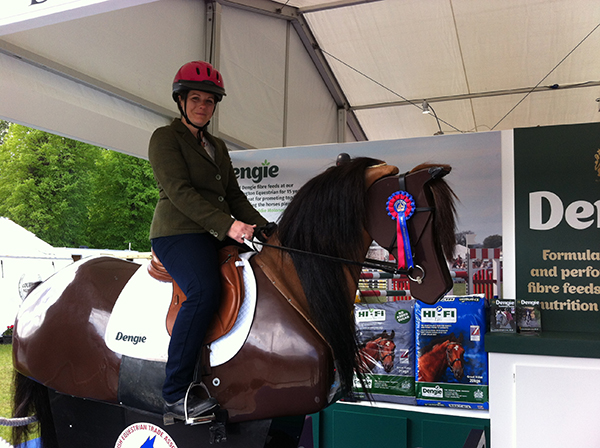
RoboCob riding sessions will take place each day from 11am to 12.30pm and 2pm to 4pm and visitors to the Dengie stand who try RoboCob will receive a goody bag (subject to availability while stocks last).
For further information, visit takeupthereins.co.uk
Are you keen to learn more about laminitis? Do you need expert advice regarding the correct and effective management of your horse or pony to minimise their susceptibility to laminitis?
If so, Equine Education is offering an excellent online course, ‘Nutritional Management of Laminitis’ which offers plentiful information and will help to enhance your knowledge of this equine disease and the practices required for correct management.
Laminitis is a widely researched disease of the horse’s foot which can range in severity from mild lameness to fatality. It is a multi-factorial problem which means that there is usually more than one contributory factor involved.
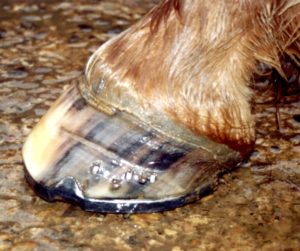
As feeding can be a major contributor to the development of laminitis, it is essential that owners are aware of and implement the correct dietary management in order to minimise the risk of their animals developing this disease.
The ‘Nutritional Management of Laminitis’ course will assess the nutritional causes of laminitis and look at the correct dietary management of animals affected with this condition. It will also cover how careful attention to the diet can reduce the risk of horses and ponies developing laminitis.
This richly informative course will cover four main topics. The first is ‘Nutritional Causes of Laminitis.’ This will look at the possible causes of diet-related laminitis and the effect of insulin resistance and obesity as risk factors for the disease.
‘Dietary Management of Animals with Insulin Resistance’ will give dietary advice for horses and ponies that are resistant to insulin. This topic will assess the suitability of various feedstuffs for horses and ponies with this condition.
The third topic, ‘Management of Obesity’ will evaluate the correct management of horses and ponies that are overweight. This will include the monitoring of weight and body condition and also discuss weight loss programmes for animals that need to lose weight.
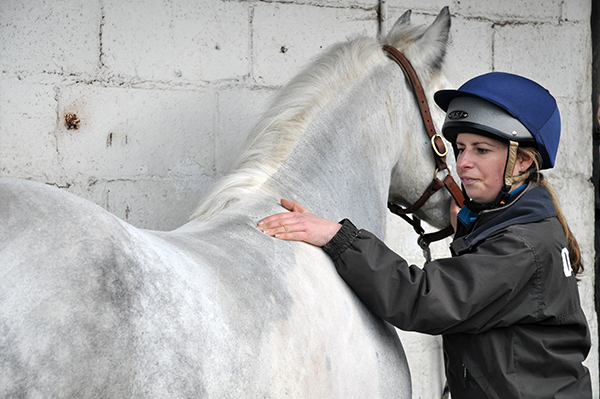
In the fourth topic, ‘Dietary Management of Animals Affected by Laminitis’ the correct methods for managing the diet of laminitic horses and ponies will be highlighted and advice for helping to minimise the recurrence of the condition will also be given.
The course will be tutored by Dr Jo-Anne Murray who is Associate Dean of Online Learning at The University of Glasgow and Senior Lecturer in Veterinary Equine Nutrition at the University’s School of Veterinary Medicine. Jo-Anne is internationally renowned for her work on equine nutrition and previously ran the much acclaimed online courses at the Royal (Dick) School of Veterinary Studies. Jo-Anne is a registered nutritionist with The British Horse Society and is also a BHS Intermediate Instructor.
As with all learning resources from Equine Education, this course is offered entirely online which enables a flexible approach whereby you can fit your learning experience around your busy schedule, and of course, your horses!
All you need is a computer and internet access and everything will be clearly explained to you online. You are able to log in whenever is convenient to you and access the relevant material. The course lasts four weeks and it is recommended that you spend approximately two hours per week engaging with the material and participating in the topical discussions.
The course, which costs £99, will start on 4 April and you will be awarded a certificate on completion by Equine Education. It is a fantastic opportunity to learn from an expert in the field of equine nutrition and enhance your knowledge of laminitis and its management.
For more information on Equine Education and this course visit their website at www.equinestudies.co.uk

